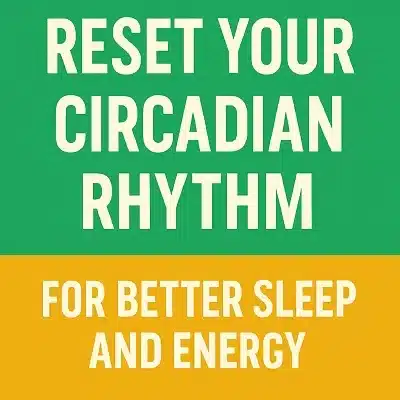You’re dragging by mid-afternoon. You wake up feeling groggy, no matter how early you went to bed. Sleep doesn’t feel restful. Caffeine barely scratches the surface. Sound familiar? The culprit might not be your mattress or your stress levels—it could be your circadian rhythm.
Your circadian rhythm is your internal clock. It governs when you feel alert, when you feel tired, and even when your hormones fire. But thanks to modern living—late-night screen time, artificial lighting, stress, shift work—it’s often totally out of whack. The good news? You can reset it. And you don’t need fancy gadgets or supplements to do it.
Here’s how to bring your body’s natural rhythm back in sync—for better sleep, more stable energy, and sharper mental clarity.
1. Get Sunlight First Thing in the Morning
This is a big one. Natural sunlight—especially within the first 30 minutes of waking—is like hitting the “start” button on your biological clock. It tells your brain: It’s daytime now. Let’s go.
The best way to do it? Step outside. Even if it’s cloudy. Even if it’s just for 5 minutes. Skip the sunglasses. Let your eyes and skin take in the light. This single habit can anchor your entire circadian rhythm.
2. Ditch the Blue Light at Night
If morning light tells your brain it’s time to wake up, then blue light at night tells it the same thing—and that’s not what you want before bed. Phones, laptops, TVs, and LED lights all emit blue light, which suppresses melatonin (your sleep hormone).
An hour or two before bed, dial down your screens. Use blue light blockers or switch your device settings to “night mode.” Even better, turn them off entirely and go analog—read a book, stretch, journal, or just sit in the dark like your ancestors did. Weird? Maybe. Effective? Absolutely.
3. Keep Your Sleep and Wake Times Consistent
Your body loves rhythm. It thrives on predictability. Waking up and going to bed at the same time every day—even on weekends—helps regulate your internal clock. Mess with that rhythm too much, and you end up with what’s known as “social jet lag.”
Start with a consistent wake-up time. Let bedtime follow naturally. You’ll find it gets easier over time as your rhythm recalibrates.
4. Eat in Alignment with Daylight
Food is another cue your body uses to set its rhythm. Late-night snacking, eating at odd hours, or skipping meals altogether can disrupt your natural cycles.
Try front-loading your calories earlier in the day and stop eating at least 2–3 hours before bedtime. Bonus: you’ll sleep better and give your digestive system a break, which helps with energy and metabolism.
5. Cut the Caffeine Curfew
Caffeine stays in your system for 6 to 8 hours. That afternoon coffee? It might be messing with your sleep, even if you think it doesn’t. Try cutting caffeine by 2:00 PM and see how you feel. Your nervous system will thank you.
Final Thoughts
You don’t need a sleep supplement stack or blackout bunker to feel better. You need light at the right times, dark at the right times, and a little consistency. Resetting your circadian rhythm is about working with your biology—not against it.
Try just one or two of these tips this week. The shift won’t happen overnight, but when it does, your sleep will improve, your energy will level out, and your brain fog will lift. Your body knows what to do—you just have to give it the right signals.


1 Comment
Fascinating article. Thanks